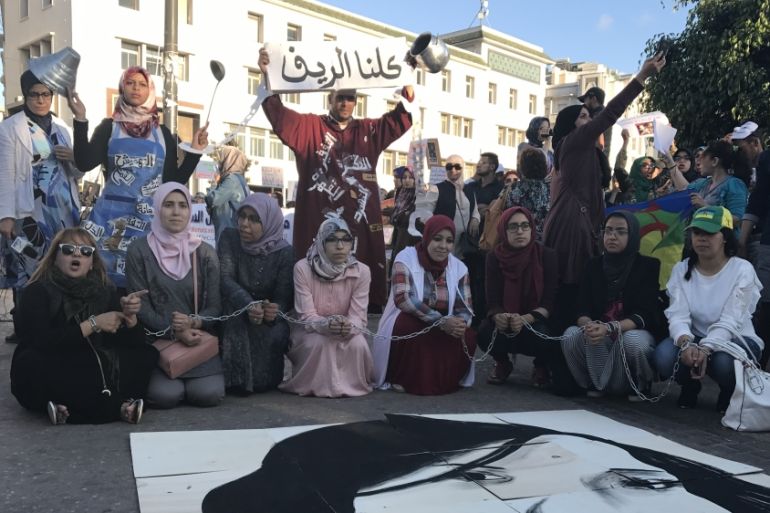Moroccan women vow to continue protests
Female activists in Casablanca and Rabat have added their voices to a chorus of anti-government demonstrations.

Casablanca, Morocco – Female activists in Morocco say they will continue to press the government for justice, just days after stiff jail sentences were handed down to activists in the northern region of Al-Hoceima.
Hundreds of women demonstrated in Casablanca on Friday to demand the release of four political prisoners associated with the Hirak movement, who were recently sentenced to 18 months in jail. Scores more remain in “preventive detention”, according to government spokesman Mustapha El-Khalfi.
On Saturday, another group of women gathered in Rabat to denounce what they deemed to be politically motivated arrests. The demonstrators were forcibly dispersed by local police.
“Despite the repression, women’s mobilisation will not stop,” Khadija Ryadi, an activist with Morocco’s women’s movement, told Al Jazeera. “Al-Hoceima has shown us that [the governing establishment]’s repression will not be able to stop the upheaval. Both men and women have the same discourse; we will not stop until they answer our demands.”
Among those demands was the release of Silya Ziani, 23, a prominent Amazigh singer and a leading voice in the Hirak movement. She was arrested on June 5 in Al-Hoceima and transferred to Casablanca.
TIMELINE: What is fuelling unrest in Morocco’s Rif?
Tensions in Al-Hoceima have been simmering since October, after the death of a young fish vendor who was crushed in a rubbish compactor truck while trying to retrieve his wares, which had been dumped by local authorities.
The incident touched a nerve with Moroccans throughout the Rif region, which has long been under-served by the country’s government. A wave of protests against official abuses and corruption led to the birth of the Hirak movement.
Calling themselves Moroccan Women Against Political Arrests, the demonstrators in Casablanca said they were taking to the streets in solidarity with Hirak, chanting: “Freedom for prisoners.” Eight women chained their hands in an effort to portray governmental repression.
“We call upon the Moroccan women in the diaspora to stand with the women in Al-Hoceima and raise their voices to demand the immediate release of the political prisoners,” activist Soraya El-Kahlaoui told Al Jazeera.
|
|
A series of events will be organised at the international level in Italy and Brussels in solidarity with Hirak, she added.
“We want the voices of Moroccan women to [convey] those of Hirak’s political prisoners. Just as in Al-Hoceima women continue the fight, we will continue it,” Kahlaoui said.

The demonstrators also replicated a well-known form of protest in Al-Hoceima known as “tantana”, which involves repeatedly banging a ladle on a pot.
“[The demonstrations are] a Moroccan initiative against political arrests, called by different actors across the Moroccan political spectrum [who are] gathered and united around one goal, which is this quest for freedom, dignity and social justice and solidarity,” human rights activist Iqbal Chaqqaf told Al Jazeera.
Activist Bouchra Rhouzlani noted that Ziani’s release was one of the group’s key demands. The singer’s spirit could be felt throughout the protest, with a black-and-white portrait held up as a symbol as protesters chanted: “We are all Silya.” Ziani was scheduled to appear in court on Wednesday.
Last month, Moroccan authorities stifled a women’s protest calling for access to jobs and health services in Al-Hoceima, encircling demonstrators to impede others from joining. Organisers said that police had been increasingly attempting to quash protests since the arrest of Nasser Zefzafi, the 39-year-old leader of the protest movement, for “undermining the security of the state”.